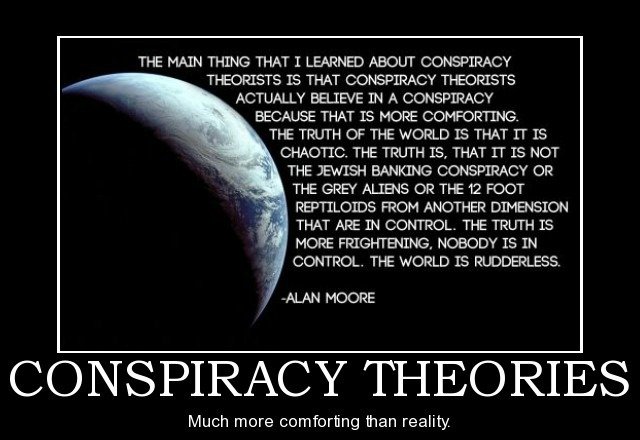Why Creationists Are More Likely to Buy into Conspiracy Theories.
When something occurs that’s hard to explain, many people say that “everything happens for a reason” and that the event was “meant to be.”
The thought provides a purpose for what, in reality, was a random, accidental event.
This type of thinking, called teleological thinking, is what gives rise to creationism, which, in this case, refers to the belief that Earth was created by an all-powerful being less than 10,000 years ago. That same kind of reasoning also promotes a belief in conspiracy theories, a new study has found.
“I think the study is a valuable and interesting contribution to work on the ways that our gut intuitions can promote particular non-scientific world views,” said Deborah Kelemen, a developmental cognitive scientist at Boston University, who was not involved in the study.
In previous research, lead study author Pascal Wagner-Egger, a social psychologist at the University of Fribourg, and his colleagues found that people who believe in conspiracy theories don’t entirely reject the fact that accidents or random events occur.
“It’s not that they reject randomness everywhere, but in some [historical and social] events, they reject randomness by seeing a conspiracy,” said Wagner-Egger. “It’s as if they were rejecting human randomness or randomness in human events but not in every world event,” such as an event in nature.
Wagner-Egger and his colleagues were perplexed by the fact that belief in conspiracy theories wasn’t associated with a complete rejection of random events. They suspected it might be because of a teleological bias, or predisposed way of thinking that also leads to a belief in creationism.
Teleology describes a way of thinking that rejects scientific reasoning but instead readily accepts that events occur because of the purpose they serve.
For example, believing that “the sun rises every day in order to provide daylight,” is a teleological thought, which is in opposition to the scientific fact that the sun rises because Earth rotates on its axis every 24 hours. (In Voltaire’s satirical novel “Candide,” the character Dr. Pangloss takes this type of thinking to its absurd logical conclusions, by arguing that spectacles fit noses because God created noses to fit spectacles.) Teleological thinking is common in childhood, but for many people, it persists into adulthood.
To see if this same method of thinking also triggers a belief in conspiracy theories, the researchers analyzed the results of surveys from three groups: a group of more than 150 Swiss college students; a group of more than 1,200 French adults; and a group of more than 700 French and Swiss college students. Across all of the surveys, participants who said they believed in creationism also tended to believe in well-known conspiracy theories, such as the Apollo 11 moon landing being fake, or that the U.S. government was involved in the 9/11 terrorist attacks. Furthermore, participants who believed in creationism and conspiracy theories were also more likely to respond to questions that indicated clear teleological bias.
Those results were surprising, said Wagner-Egger, because conspiracism and creationism explain two different aspects of the world. “Creationism and teleological thinking are about the natural world, and conspiracism is about social and historical events,” he said, but the survey results suggest that teleological thinking spurs both creationism and conspiracism.
The researchers found no relationship between conspiracism or teleological bias and age, gender, religion or political orientation. But they did find a link with education level. “It is a common finding that the people who are less educated believe more in conspiracy theory,” Wagner-Egger said.
It’s a matter of not only education but also social status, Wagner-Egger added. Previous research has found that “minority groups and people in the fringe of society believe more in conspiracies because [they’re] not in the system,” or tied to sources of authority, he said. As a result, they are more inclined to think that leaders and governments are hiding things from them.
Wagner-Egger said it’s not bad to think critically about information from sources of authority, but conspiracists take it too far and focus only on the narrative of a conspiracy, refusing to consider arguments refuting their theories. Conspiracists “are not skeptical in the right way,” Wagner-Egger said. “If you reject all [arguments], we cannot discuss anymore, and it’s clearly a problem for years to come,” he said.
Growing conspiracism could have severe consequences, Wagner-Egger noted, as conspiracy beliefs are linked with things like vaccine rejection and climate change denialism. People should be careful when following old beliefs, “because those beliefs are based on our cognitive biases,” he said.
“Cognitive biases — like the teleological bias — develop early and are cross-culturally recurrent,” Kelemen said. “Given this, we should probably start intervening earlier if we want to effectively promote scientific literacy and reduce non-scientific mindsets, like conspiracy beliefs, that can promote fear and paranoia.”




